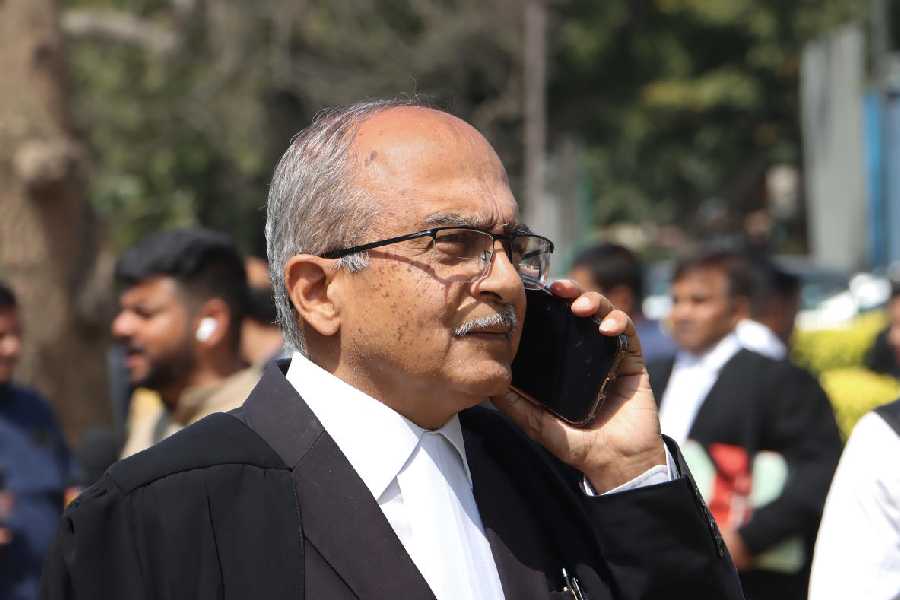The Supreme Court on Monday dismissed pleas from two NGOs for the disclosure of data on the Rs 4,000 crore worth of electoral bonds transacted between March 1, 2018, and April 11, 2019.
It said it had taken a “conscious” decision to fix April 12, 2019, as the cut-off date when it first passed an interim order nearly five years ago directing the SBI to reveal the bond details.
The five-judge constitution bench also rejected pleas from industry chambers Ficci and Assocham, which argued that the disclosures would be a breach of the “confidentiality” doctrine surrounding the trading of the bonds.
“In our judgment we have taken a conscious decision that the cut-off date should be the date of interim order,” Chief Justice D.Y. Chandrachud orally told the Citizens Rights Trust and advocate Prashant Bhushan, representing the main petitioner, the Association for Democratic Reforms.
“We took that date (April 12, 2019) because it was our considered view that once an interim order was pronounced, everybody was put on notice. If we have to go back to an earlier date, it will become a review of the judgment.”
The February 15, 2024, apex court judgment ordering the disclosures relates to electoral bonds issued after April 12, 2019.
“The relief which has been sought in the Miscellaneous Application for pre-dating the point of disclosure would amount to a substantive modification of the judgment. Hence, it cannot be dealt with in a Miscellaneous Application. The Miscellaneous Application is, therefore, not maintainable and is accordingly dismissed,” the court said.
Earlier, senior advocate Mukul Rohatgi had told the court that Ficci and Assocham had filed applications opposing the direction for the disclosure of the electoral bond numbers (which link specific donors to specific political parties)
He underlined that the corporate bodies that bought the bonds had not been heard before the February 15 order was passed.
“Mr Rohatgi… with effect from April 12, 2019, we directed the collection of details, so you were put on notice,” Justice Chandrachud remarked, implying the industry bodies could not approach the court at such a late stage in a five-year-old matter.
Mathews Nedumpura, an advocate from Mumbai who was appearing for certain interveners, complained that the court had not heard the citizens at large before passing the February 15 judgment. When he persisted, the bench warned him of contempt action.
“The whole world knew these proceedings were going on. You have come here after the judgment is delivered. We can’t hear you now,” the bench observed.
Industry reaction
Ficci sources told this newspaper that ease of doing business was a key element of India’s competitiveness globally, and retrospective action reduced business confidence among Indian and global investors. “This was the basis for our application,” a source said.
Industry sources said they were comfortable with two separate lists of donors’ and recipients’ data – as released so far -- but not with the disclosure of the bonds’ alphanumeric serial numbers.
Industry fears that the release of alphanumeric data could face India Inc with the risk of political retribution.
Bar chief rap
The bench was irked when Supreme Court Bar Association president Adish C. Aggarwala tried to mention a letter written to Justice Chandrachud in which he had sought a “suo motu” review of the February 15 judgment.
“Mr Adish Aggarwala, apart from being a senior advocate you are president of SCBA. You know the procedure. You have written a letter asking me to invoke my suo motu jurisdiction. You have no locus,” Justice Chandrachud said.
“These are all publicity-oriented. We will not permit it. Please keep it at that, otherwise I will have to say something distasteful.”
Solicitor-general Tushar Mehta sought to dispel the impression that the government was behind the plea for a review of the judgment. He alleged that NGOs and social media were trying to influence court proceedings.
The bench remarked: “Our shoulders are broad enough to (withstand) social media commentary.”
Additional reporting by our business bureau











